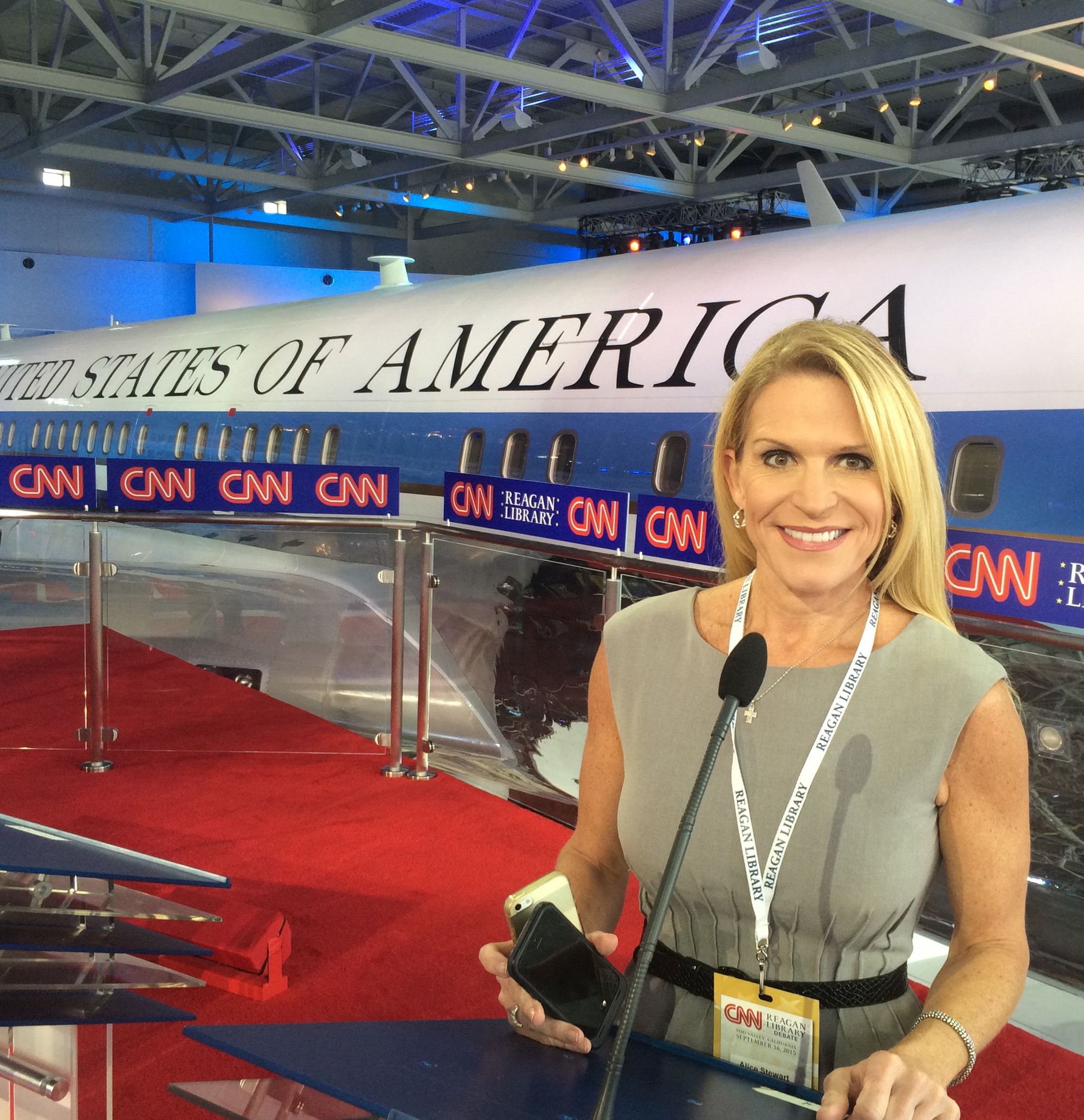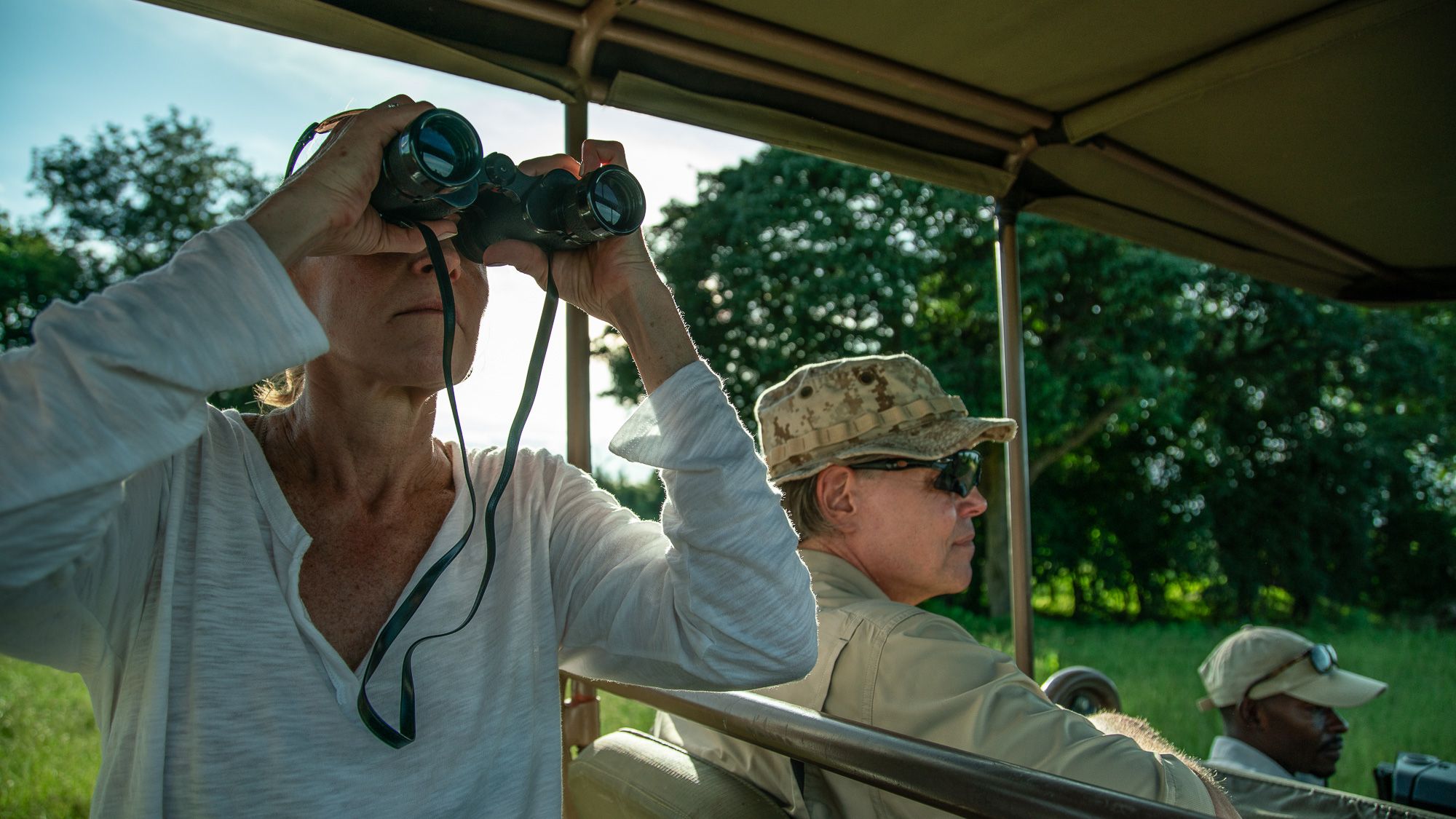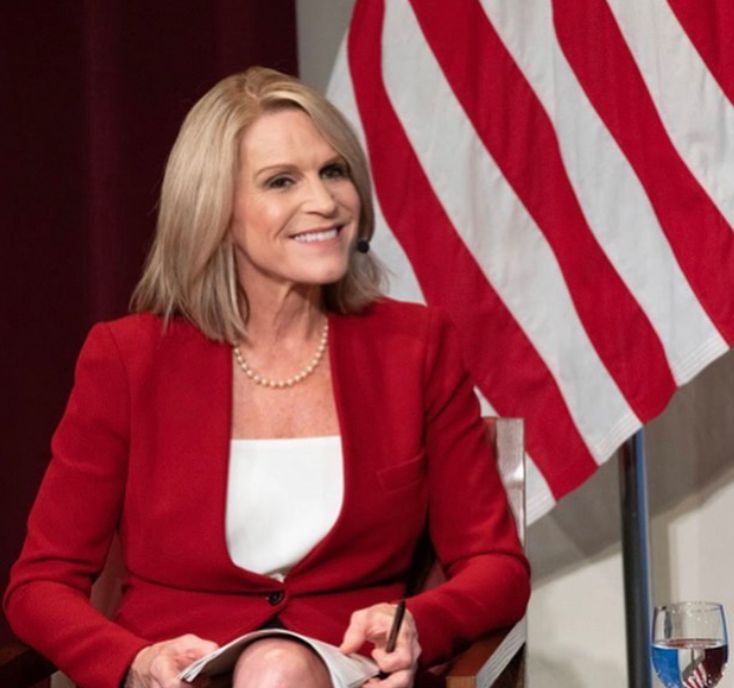Alice Stewart is a CNN and NPR political contributor. She also current serves as a Fall 2020 Fellow at Harvard Kennedy School's Institute of Politics. She has previously worked as a journalist and news producer in addition to advising multiple presidential campaigns on strategic communications. Stewart spoke with Indu Pandey in late October.
Tell me about your background in journalism as well as in strategic political communications.
I went to the University of Georgia where I graduated with a degree in broadcast news and political science. I always wanted to be in news. So, I started out as a reporter and producer in Savannah, Georgia, and then I went to work in Atlanta behind the scenes as a producer and then to Little Rock, Arkansas, where I was a news anchor and reporter. I loved, you know, learning new things. I loved covering politics. I loved courts; I loved breaking news. But, several years ago, I just realized that there might be something different for me to do. I became friends with Governor Mike Huckabee in Arkansas, and we just developed a rapport and he had an opening in the governor's office.
He offered me a job as communications director in the governor's office. Shortly thereafter, Huckabee ran for president, and I started working on his presidential campaign. And since then, I've worked in communications on four presidential campaigns and been Deputy Secretary of State in Arkansas. Now, after 2016, after the presidential campaign of Ted Cruz, when he got out of the race, I was offered a job at CNN as a political commentator. And I now have the good fortune to talk about politics on the news. I also write for CNN’s website, I do commentary for CNN International, and I'm a contributor on National Public Radio.
So, you have experience on both a political communications team as well as in more traditional news media. Do you view that relationship between the two as adversarial or mutually beneficial?
Politicians can shun the media all they want, but the media is going to cover it. There's a reason why the media is called the Fourth Estate because the media is there to keep an eye on politicians and hold them accountable. There’s also a role for the media to help politicians carry out their message and get the message out. But, at the same time, the role of media and journalism is to hold public officials accountable and be the eyes, ears, and voice for the people. That comes with a great responsibility—you have to make sure that you get it right, you don't pick sides, you play fair, and you report the facts and let the people decide.
There is increasingly partisan media where two different news networks could report on an event entirely differently just by changing the frame of reference. What is the impact of a partisan media on being able to hold public officials accountable?
I grew up in a time when there were only three evening newscasts a day. Now, there are so many choices and options. The news is a business and it will provide content for what people are interested in. If people are thirsty for content that might lean more to the right then a news outlet should provide that. There's been so much growth in the media in this way because the people demand it. People want it. Some people prefer the echo chamber of a media outlet that caters to their silo of ideology. And, some people prefer media that gives them more level coverage of the news, so they can make up their own mind. The media is a business of supply and demand and they're going to supply whatever the public demands.

How does campaign messaging affect how American values are perceived and received abroad? Is there a role for political campaigns to shape how other countries view America? Do you think that adds weight to your job?
I've traveled quite a bit internationally, and so much of what people internationally see about American politics is based on the news coverage as opposed to the campaign messaging of a particular candidate. What your messages focus on isn’t necessarily what the media is going to cover.
Internationally, people seem to be more focused on the tone and tenor of American politics as opposed to the policy of American politics. They are fixated on the way that President Donald Trump acts and behaves and the way Joe Biden acts and behaves more so than the political implications of what Trump and Biden are doing. And that's simply because the actual policies really don't have an impact in Zambia or Germany.
People’s first comment is: what’s going on with American politics? Will it always be so divisive, disrespectful, polarizing? I'm a Republican; I voted for Trump. But, quite often, I don't like his tone and tenor. People in other countries know what nice is and they know what mean is. None of that is lost in translation. A lot of them have a bad taste in their mouth about American politics and often ask: is American politics going to be this way forever?
I tell them, I don't think so. I think this was a person that connected with an electorate in this country that felt as though people weren't listening to them. He grabbed a hold of their attention and they appreciate the way that he fights for them and stands up for them. And, you know, it's certainly not the way most politicians would do it, but it certainly has resonated with a lot of people and they appreciate that.
You mentioned that neglected populations in the United States view Trump as a friend who will fight for them. Do you feel like the same sentiment is felt abroad in light of America's consistently declining favorability ratings over the last four years and Trump's fairly explicit isolationist policies?
Well, look, I think it's important to realize that we can have allies. You can look at what happened with the president at the North Atlantic Treaty Organization (NATO) and everyone having ill feelings about the president and the way he acted towards them at NATO. It's important to realize you can have friends and allies, but still expect to hold them responsible. The president made it quite clear that we're not the ATM for the world. The American taxpayers are footing the bill for a lot of these organizations where other countries can pay more. It doesn't mean that they're not our ally and we're not on friendly terms with these other countries, but at some point they have to expect we're not going to be just a blank check to support them.
How do we balance being allies and trying to hold people accountable? Do you think the strategy Trump took was effective or ultimately weakened the NATO alliance?
It was effective in that many of them did increase their commitment and their contribution to the alliance and that's critical. I don't see where any of these alliances are any different than any other kind of agreement that you have, whether it's on a personal or political or business level, where you expect everyone to pay their fair share. And yes, there are countries that can't afford it. But, when countries can't afford it and they're not paying their fair share, I don't see anything wrong with expecting them to step up to the plate and do so now. It would have been a more understandable request if he had done it with a little more courtesy, but that's his nature is to just call a spade a spade.
Is it possible in a globalized world to have an exclusively America First or Germany First approach? Because most Western democracies as well as fully developed democracies have intricate webs of alliances where if their ally is harmed, they are also obviously harmed. So, for example, Germany, can't always prioritize its own needs in the context of the EU. Similarly that the United States is part of a lot different defense treaties across the world, is it always possible for the United States to put itself first while maintaining security abroad?
No, that's a great question. And it raises a great point. Saying “America First” doesn't mean that we're not going to work together when there are times that alliances or international cooperation are needed. He can say “America First,” but that doesn't mean America alone. He feels that other countries have taken advantage of America in terms of financial resources in large part. The World Health Organization is another great example. The contributions we make to the World Health Organization far outweigh other nations—China, for example, has more people. So I think it's important to recognize what he's trying to do is level the financial playing field. If there is a need from the United States, he will (and he’s demonstrated that he will) answer the call and he's worked together with other nations with regard to COVID-19.
Right. Do you view these alliances as strengthened in light of the Trump presidency? There’s certainly a case to be made—at least in the last year—that alliances have weakened. For example, sanctioning policy, which used to be uniform between the EU and the United States, has widely diverged. Different degrees of sanctions were levied on Belarus, Russia, and Iran between the United States and the EU. The United States has stronger sanctions on Hong Kong than its EU allies. So, where do you see the real strength of the Trump presidency's diplomacy posture?
I think you have to separate a lot of the political posturing and the economic sanctions with what we're seeing and hearing—a lot of is their frustration with the way in which the president carries out policies. I think the fact is that Trump has had conversations and met with leaders of the EU and flexed American muscles. I don't see that as harming those relationships. I see that as a way of commanding more respect for the United States. Do I wish he would be stronger with regards to Russia and sanctions and pushing back? Yes, but he obviously knows a lot more about why he's making the decisions that I do. I trust that he's doing the right thing.
The way that this administration has stood up to China (and he talked about this on the campaign trail, pushing back on China with currency manipulation and the theft of intellectual property) has been critical. I saw firsthand in Africa, the consequences of China's debt trap diplomacy throughout the continent, where they will promise to build structures, knowing that Africa would default on payments and China would seize ownership of valuable property, land, and infrastructure.
And the fact that, you know, Vice President Mike Pence has been quite vocal on pushing back on their Belt and Road Initiative. And with that, you know, there's the responsibility for America to step in and, and help, where needed. But I think Trump standing up strong against China is beneficial.
My question then is once again, where do you see the positives in America’s push versus China? So, China actually had a much more booming economy than the United States and its other Western allies this last quarter. And, it's obviously still expanding its Belt and Road Initiative while the US steel industry is doing rather poorly as a result of the tariffs that were placed as part of the so-called “trade war”. So, where do you see the United States making progress in, as you put it, holding China more accountable for its actions?
Even if it's nothing more than shining a light on China’s behavior. It's easy for us to say to these poor countries, don’t fall into the debt trap diplomacy from China, just because they're offering to build you a school or put a satellite in your town.
And I'm a big advocate for humanitarian relief. But, I think part of the responsibility for us calling out places like China that are engaging in these harmful practices is we have to give them an alternative and give them some help in the meantime. We can't just say don't deal with China, but we're not going help you on the other hand. And so I do think it's incumbent on this administration to step up with a lot of our humanitarian aid.
Do you then find that the Trump administration's posture on China's been a little bit counterproductive then given that Trump has overseen one of the largest cuts in the State Department's budget over the last four years in addition to a decrease in military aid overall to smaller countries like in West Africa and a decrease in developmental aid? So, if there does need to be an alternative to China's Belt and Road Initiative is Trump's policy here effective?
Some of this predated President Trump. I'm not saying he's the savior of all of this, but there's a lot of what America does that people don't realize why we might be cutting back here, but, you know, we're not leaving an empty hole where resources are needed. So, there's certainly a lot of that going on. I think putting resources in those regions there to provide safety and jobs and security will go a long way to, you know, making it safe for people to stay there. And, you know, they wouldn't feel the need to come to this country because their home country is safe and there's economic opportunity. I think overall there's been a lot more positive, tremendous accomplishments with regard to international politics than the alternative.

So, switching topics, there's certainly been a tension in this American campaign cycle between free speech and disinformation in the social media era, where anyone can post anything and reach a really large audience. Where do we draw the line between respecting that free speech and creating safeguards against this information? What is the role of the media in this dynamic?
The news media has a role to provide the news and present both sides and be fair and be accurate. If they get something wrong and there's a malicious intent to get something wrong, then they can be sued and they should pay the consequences. And, on the other side, you have social media that are protected under Section 230, which says that they can put information out there.
And, they are not subjected to the same requirements or restraints as publishers, like news outlets because they're just platforms for free speech. And, when you get these social media outlets that are picking and choosing which information they want out there, then they're no longer a platform. They are an aggregator of news content and therefore they should lose their protections. And if it's fact or fault that was free speech, whether they're screaming it at the top of their lungs on the street corner or they're posting it on Twitter, that's free speech. And, Twitter is a platform for free speech. They're not a publisher for news content.
Right. These social media companies are private actors and you must sign certain release statements and the like to be able to be on their platform. Why are certain restrictions okay for social media companies to impose and others not?
Well, the only restrictions they should do are ones that are dangerous or child pornography or nudity, but these platforms shouldn't indiscriminately decide what stories they want on there and what stories they don't want on there. That's not their role; they’re platforms to provide people's speaking freely.
Sure. So, you mentioned that, social media companies are allowed to restrict content that they view as dangerous, like something really morally abhorrent—child pornography or something like that. So, where do we draw the line on what they're allowed to restrict? If it is dangerous—if they find a story published by QAnon or something that is blatantly false—such that it leads to dangerous misinformation, are they allowed to block that?
I don't know the direct answer to that, but when someone's posting outlandish information, I think for anyone to speculate, “this is going to force or cause someone to do something harmful.” That's quite a jump. And it's quite speculative. I think any rational person knows what is dangerous content and what's child porn. The question is if they're going to decide amongst themselves, what is false information and what should be posted. And I mean, what's dangerous about the information about Hunter Biden, getting millions of dollars from Burisma and making connections with his father? What's dangerous about that? Whose life is in danger with that news? No one, but yet Twitter and Facebook and these news outlets decided to block that content. So, I think it's not that they're indiscriminately deciding what they want posted for their own reasons or political leanings. It's not, it's not just a matter of what's dangerous and pornography. It's a matter of what's politically beneficial or desirable for big tech.
The interview was condensed and lightly edited for clarity.
Images courtesy of Alice Stewart.




